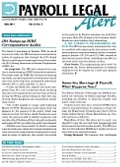A quarter-billion dollars is a lot of money. Yet that’s the amount the U.S. Department of Labor collected in unpaid minimum wages and unpaid or underpaid overtime wages for employees during fiscal year 2013. Worse: In addition to paying employees back wages or overtime, employers that underpay will be liable for liquidated, or double, damages. And liquidated damages are the rule, rather than the exception. Paying employees correctly the first time is your best strategy.
Employees have two years to sue for nonwillful pay mistakes, and three years to sue for willful mistakes. Warning: If employees’ workdays expand, by say, coming in early or working late at home, you will have a hidden overtime problem on your hands. And it’s not enough to have policies that simply prohibit employees from working unpaid overtime; you must ensure that managers enforce those policies. Learn from others’ mistakes.
Mistake No. 1: Not paying for all of employees’ working time. Employees’ prework or post-work activities are compensable if those activities are principal activities that benefit the employer, and not the employees. Examples: One company was snagged for inspecting employees’ bags at the end of the workday for stolen items. Another required employees to be present for preshift meetings.
Mistake No. 2: Not paying employees who work through meal breaks. Employees don’t need to be paid for their meal breaks if those breaks are at least 30 minutes long, and they are completely relieved from work. Watch out: Some timekeeping systems automatically deduct for meal breaks, whether or not employees are completely relieved during that time.
Mistake No. 3: Not paying employees for waiting time. Employees who wait around for work must be paid. Example: Call center employees who spent time waiting for work areas to become available after their shifts started had to be paid for that time.
Mistake No. 4: Not paying employees for travel time. Employees’ commuting time isn’t compensable. This is true even if employees go from home to the first job of the day and return home after the last job of the day. But employees’ travel time to different job sites during the day is compensable.
Mistake No. 5: Miscalculating overtime pay. Employees earn overtime at 1.5 times their regular rates of pay. As a general rule, any payment that’s measured by or based on employees’ hours worked, production or efficiency must be included in wages for purposes of determining the regular rate. Examples: Companies have failed to include shift differentials, bonuses, commissions and other incentive payments in the regular rate calculation.

